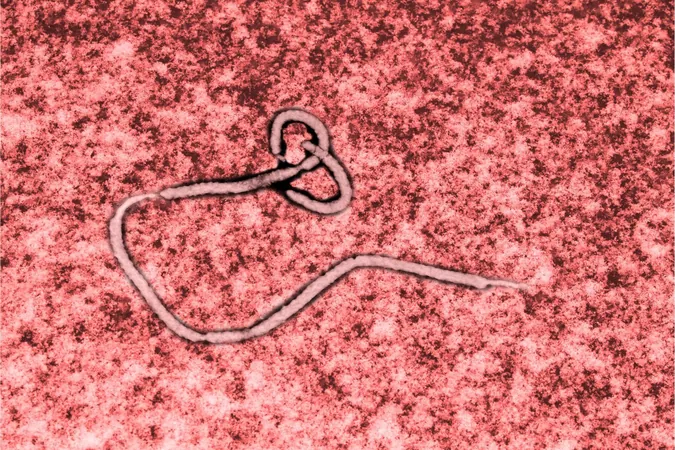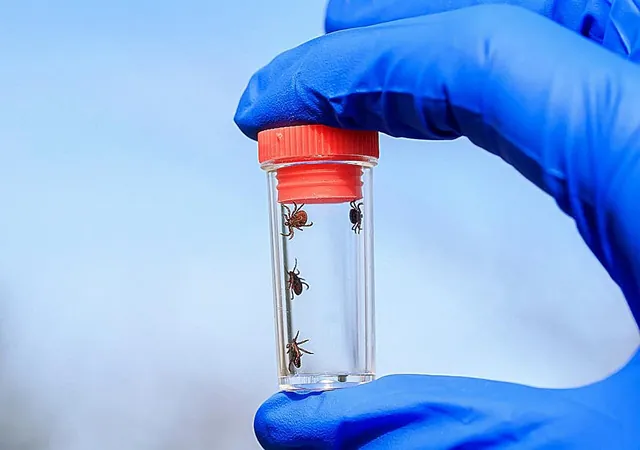
Breakthrough in Ebola Treatment: Experimental Pill Achieves Near-Complete Survival in Monkeys!
2025-03-17
Author: Jia
Breakthrough in Ebola Treatment: Experimental Pill Achieves Near-Complete Survival in Monkeys!
In a stunning breakthrough, scientists may have discovered an easy-to-administer pill that could revolutionize the treatment of one of the deadliest diseases known to mankind: Ebola. Recent research from the University of Texas Medical Branch, published in the journal Science Advances, reveals that an experimental oral antiviral named obeldesivir remarkably reduced the fatality rate of Ebola infection by preventing up to 100% of deaths in infected monkeys.
Study Focus and Method
The study focused on a lethal strain of the Ebola virus known as Zaire ebolavirus, which can have a staggering fatality rate of up to 90% if left untreated. This virus is notorious for its rapid onset of symptoms, including high fever and severe internal bleeding, making it one of the most feared pathogens in the world.
This groundbreaking research involved administering obeldesivir to cynomolgus and rhesus macaques one day after they were exposed to a lethal dose of the virus. The results were nothing short of extraordinary: all rhesus macaques treated with obeldesivir survived the infection, while 80% of their cynomolgus counterparts also pulled through. The drug not only inhibited viral replication but appeared to enhance the monkeys' immune response, a dual benefit that could prove crucial in combatting Ebola.
Ebola Transmission and Current Treatments
Ebola is a zoonotic disease, primarily transmitted to humans from infected animals, particularly African fruit bats. Though severe outbreaks are rare—recent incidents have included outbreaks in West Africa that infected nearly 30,000 individuals between 2014 and 2016 and resulted in over 11,000 deaths—the disease continues to pose a significant public health threat.
Currently available vaccines and treatments have limitations, including the need for cold storage and intravenous administration, which can hinder accessibility during outbreaks. Obeldesivir, a derivative of remdesivir, which was initially developed to treat COVID-19, could provide an oral treatment option that is far easier to distribute and administer in affected regions.
Potential Against Other Viruses
In earlier studies, researchers had already indicated obeldesivir's potential effectiveness against Sudan virus and Marburg virus, another deadly relative of Ebola. With outbreaks of Marburg recently reported in Tanzania, the need for innovative treatments has never been more pressing.
Implications of Research
While further research is essential to validate the effectiveness of obeldesivir in humans, the implications of these findings are profound. According to the researchers, “For outbreak response, oral antivirals might present substantial advantages over now-approved intravenous drugs, such as easy supply, storage, distribution, and administration.”
As we continue to grapple with the specter of infectious diseases, obeldesivir represents a beacon of hope in our fight against Ebola and similar viral threats. Stay tuned for more updates on this promising development in public health!



 Brasil (PT)
Brasil (PT)
 Canada (EN)
Canada (EN)
 Chile (ES)
Chile (ES)
 Česko (CS)
Česko (CS)
 대한민국 (KO)
대한민국 (KO)
 España (ES)
España (ES)
 France (FR)
France (FR)
 Hong Kong (EN)
Hong Kong (EN)
 Italia (IT)
Italia (IT)
 日本 (JA)
日本 (JA)
 Magyarország (HU)
Magyarország (HU)
 Norge (NO)
Norge (NO)
 Polska (PL)
Polska (PL)
 Schweiz (DE)
Schweiz (DE)
 Singapore (EN)
Singapore (EN)
 Sverige (SV)
Sverige (SV)
 Suomi (FI)
Suomi (FI)
 Türkiye (TR)
Türkiye (TR)
 الإمارات العربية المتحدة (AR)
الإمارات العربية المتحدة (AR)